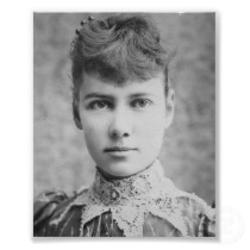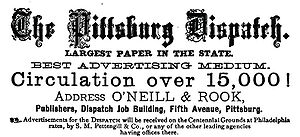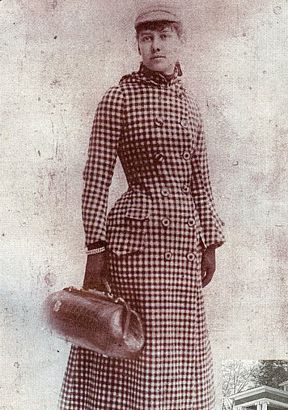
The insane asylum on Blackwell’s Island is a human rat trap. It is easy to get in, but once there it is impossible to get out. —Nellie Bly
Elizabeth Cochrane has a secret.
She isn’t the madwoman with amnesia the doctors and inmates at Blackwell’s Asylum think she is.
In truth, she’s working undercover for the New York World. When the managing editor refuses to hire her because she’s a woman, Elizabeth strikes a deal: in exchange for a job, she’ll impersonate a lunatic to expose a local asylum’s abuses.
When she arrives at the asylum, Elizabeth realizes she must make a decision—is she there merely to bear witness, or to intervene on behalf of the abused inmates? Can she interfere without blowing her cover? As the superintendent of the asylum grows increasingly suspicious, Elizabeth knows her scheme—and her dream of becoming a journalist in New York—is in jeopardy.
A Feigned Madness is a meticulously researched, fictionalized account of the woman who would come to be known as daredevil reporter Nellie Bly. At a time of cutthroat journalism, when newspapers battled for readers at any cost, Bly emerged as one of the first to break through the gender barrier—a woman who would, through her daring exploits, forge a trail for women fighting for their place in the world.
The indominable Nellie Bly
In 2014, when I read Nellie Bly’s Ten Days in a Mad-House—the newspaper account of her asylum ordeal—I searched for the novel and found it didn’t exist. How was it no one had written about this brave woman who went undercover inside a mental institution more than 130 years before? I’d wanted to write a book since I was a child, and had always gravitated to historical fiction, so the idea for A Feigned Madness was born.
After months of research and two trips—one to Pennsylvania to see Bly’s childhood home and view her personal letters, and another to New York City to visit Bly’s stomping grounds—the woman behind the story began to take shape.

Bly’s real name was Elizabeth Cochrane and she was born into a family of wealth. However, the sudden death of her father when she was a child, his lack of providing a will, and the reduced circumstances that followed her and her family over the ensuing years, meant Bly had to fend for herself from an early age. Luckily, these circumstances, while difficult, helped mold her into the tenacious, goal-driven woman she would later become known for.
It was when Bly turned twenty that a chance reading in a newspaper altered the course of her life. In the Pittsburg Dispatch, she stumbled on a story entitled “Woman’s Sphere” by columnist Erasmus Wilson in which he wrote there was but one place for a woman: home. She was so infuriated, she dashed off a letter to the editor disagreeing with Wilson, signing it Lonely Orphan Girl. The managing editor of the Dispatch, George Madden, was so impressed, he invited her to appear at the paper’s office.

Madden was looking to add something fresh to the Sunday edition. With training, maybe this young slip of a girl would be just the thing. He asked Bly to craft replies to the male reader who’d prompted Wilson’s piece. She did so with enough skill to convince Madden to hire her. Because women weren’t permitted to use their real name in print (female reporting was considered vulgar), Madden assigned her the pseudonym that would one day be famous: Nellie Bly.
She would use it for nearly four decades.
Madden promptly assigned Bly to the women’s pages, the section where little more than the latest fashions and city gossip were shared. Bly hated it from the start. It was when Madden granted her permission to write about themes of her own choosing that she really shone. Her readers, by way of her ever-increasing fan mail, agreed.
What were the stories she pursued? The plight of young women forced to work at low-paying or health-imperiling jobs, divorce reform to prevent “drunkards and ne’er-do-wells” from marrying unless they disclosed their past, sketches of the female working poor. Bly never balked at difficult interviews. She simply took charge in her direct, audacious way and learned what she could, and then spilled it all out in print. She would work a year at the Dispatch and another six months as the paper’s correspondent in Mexico. When she returned to Pittsburgh, she could no longer stomach writing for the women’s pages.
It was time to move on.
She was barely twenty-three when she moved to New York City to find work as a reporter. When she clashed with editors who told her women weren’t fit for journalism, Bly concocted a scheme to get hired. She presented the managing editor of the New York World with a list of story ideas she was willing to pursue. They all involved risky undercover scenarios. It was the only way to get his attention.

Bly was brave, but she was also broke. At the time, she was still working for the Pittsburg Dispatch as a correspondent, but the pay was neither good nor steady. Her mother had accompanied her to the city, so Bly had her to support as well.
In a cruel twist of fate, days before she arrived at the World office, Bly left her reticule on the train with the last of her pocket change in it. To get to the newspaper that fateful day, she had to borrow cab fare from her landlady. So, the woman who showed up in the editor’s office was desperate. The last thing she wanted to do was return home a failure. New York had all the opportunities she was looking for, and the New York World was the paper she most wanted to work for. It was the biggest paper in a city of big papers.
The editor told her to come back in a week for an answer. When she returned, she was offered one of the reporting jobs on her list—that of impersonating a lunatic. Her goal: Blackwell’s Island.

In Bly’s day, Blackwell’s Island (now called Roosevelt Island) was like a trip to hell. It housed a penitentiary, a workhouse, almshouses for the poor, and a women’s mental asylum. Misery reigned supreme. Many who ventured over the East River and docked at Blackwell’s never returned. Bly knew all this when she accepted the assignment, but she agreed to it anyway.
It’s up to the reader to discover what happened during those ten days Bly spent at the asylum and the events that transpired afterwards, but suffice it to say the World kept Bly on.
More investigative reporting followed. She even tried her hand at writing fiction (she published a novel). She would travel around the globe while the world watched and beat the fictional Phileas Fogg’s time in Around the World in 80 Days, a feat that catapulted her to fame in 1890. She eventually married (a multimillionaire forty years her senior), presided over an ironworks empire, and became a WWI correspondent in Austria.

Through it all she was fierce and tenacious, but she was also compassionate to the marginalized, the poor, the mistreated, and those down on their luck. Whatever she did, she did with heart.
Perhaps her mentor Erasmus Wilson, the columnist who’d so angered her years before and inadvertently sprung her career as a journalist, said it best. “[T]here is no such word as ‘fail’ in her lexicon.”
Buy Links: Amazon UK •Amazon US
Meet Tonya Mitchell

Ever since reading Jane Eyre in high school, Tonya Mitchell has been drawn to dark stories of the gothic variety. Her influences include Mary Shelley, Edgar Allan Poe, and Bram Stoker. More contemporarily, she loves the work of Agatha Christie, Margaret Atwood, and Laura Purcell. When she landed on a story about a woman who feigned insanity in order to go undercover in an insane asylum, she knew she’d landed on something she was meant to write. Her short fiction has appeared in, among other publications, Glimmer and Other Stories and Poems, for which she won the Cinnamon Press award in fiction. She is a self-professed Anglophile and is obsessed with all things relating to the Victorian period. She is a member of the Historical Novel Society North America and resides in Cincinnati, Ohio with her husband and three wildly energetic sons. A Feigned Madness is her first novel.
Connect with Tonya:
Website: https://www.tonyamitchellauthor.com/
Facebook: https://www.facebook.com/TonyaMitchellAuthor/
Twitter: https://twitter.com/tremmitchell
Instagram: https://www.instagram.com/tmitchell.2012/
Goodreads: https://www.goodreads.com/author/show/20194868.Tonya_Mitchell
Thank you Mary Anne! Talking about Nellie Bly never gets old!
Such an interesting post.
Thank you so much for hosting today’s stop!